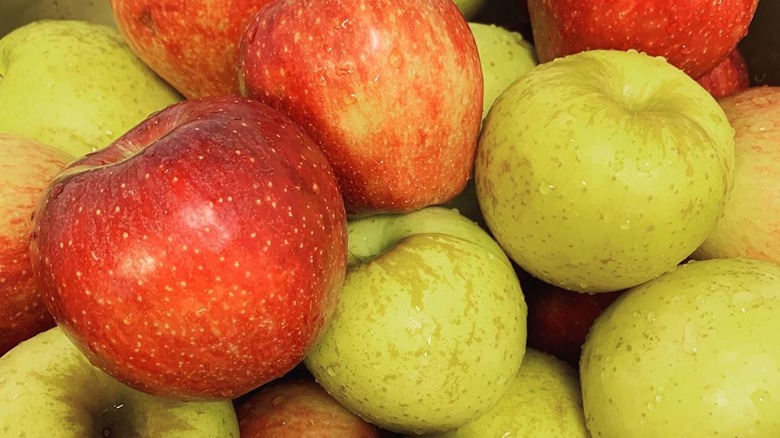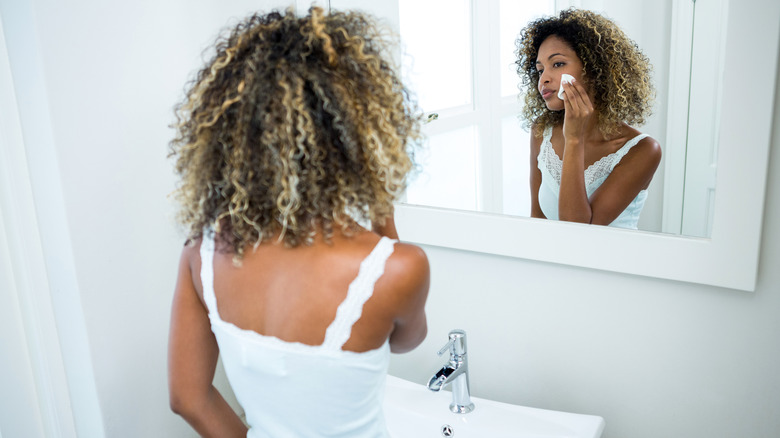Put Apple Cider Vinegar On Your Acne And Watch What Happens
The health benefits of apple cider vinegar have become a popular answer for folks looking to combat blood sugar levels, lose weight, and even protect against cancer (via Healthline). For many, it's a bit of a miracle drink. Since vinegar is known to kill certain types of bacteria and viruses, it's no surprise that apple cider vinegar has also been a solution for people struggling with skin issues (via Science Direct).
For one thing, Propionibacterium acnes is a bacteria that is linked to acne. While there is little research linking apple cider vinegar — or ACV — to the reduction of acne, ACV includes acetic, citric, lactic, and succinic acids, which have all been proven to kill P. acne (via NCBI). In other words, while most times ACV is used for cooking or baking, it can also be used to treat your pesky acne concerns.
How can apple cider vinegar improve your skin?
When you ferment apple cider, or juice from pressed apples, apple cider vinegar is the result. According to WebMD, this is done by adding yeast, which then turns the sugar in the juice into alcohol. Organic (or unrefined) apple cider vinegar has a "mother," which is a cloudy mass that sits on the bottom of the bottle. Don't fear the mother! This is where all of the proteins, enzymes, and beneficial bacteria live (via Wellness Mama). S. W. Basics founder Adina Grigore, told Byrdie, "It's the best astringent in nature because it helps to balance the skin's pH, making you both less oily and less dry."
Even after acne is healed, ACV is known to improve the scarring and discoloration caused by acne. The organic acids in ACV are known to be the reason for this, and the process of applying the organic acids is sometimes called "chemical peeling." The acids (primarily succinic acids) in the ACV remove the outer layers of the skin, which helps promote regeneration. So whether you have scars or acne, the ACV works as a peel and sloughs off layers of skin (via Heavenly Botanicals).
Although studies have found that the acids in ACV can cure acne, there are no concrete studies linking ACV itself with this feat. Ellen Marmur, MD, told Women's Health, "While I don't think that apple cider vinegar can actually cure acne, I do believe that the ingredient can help dry out whiteheads."
Here's how to use apple cider vinegar for acne
It's incredibly important to dilute the ACV before applying it to the skin because of its high acidity. It's best to try out a small patch of skin at first to make sure the ACV doesn't irritate the skin. In order to make your own ACV toner, mix one part ACV with three parts water. Clean your face with your favorite face wash. Take a cotton ball and dip it into the ACV mixture and gently rub the cotton ball on your skin. After letting it sit for 15 to 20 seconds, rinse the ACV off with water. Repeat this process in the morning and night (via Healthline).
If you find ACV to be too harsh on your skin (causing dryness or burning), use it every other day or cut it out completely (via Journal of the American Academy of Dermatology). People with acne may already have highly-sensitive skin, and its best to not disrupt the skin any more than it already is if that's the case. However, if ACV works for you, you could even branch out and experiment with essential oils by putting a few drops into your ACV formula — and watch your skin glow.


